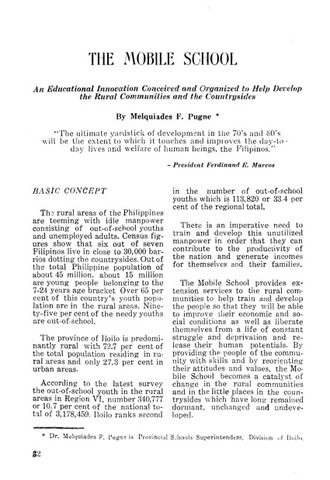The mobile school
| dc.contributor.author | Pugne, Melquiades F. | |
| dc.date.accessioned | 2023-03-27T00:13:51Z | |
| dc.date.available | 2023-03-27T00:13:51Z | |
| dc.date.issued | 1979 | |
| dc.identifier.uri | https://hdl.handle.net/20.500.12852/2569 | |
| dc.description | Journal article | en_US |
| dc.description.abstract | The rural areas of the Philippines are teeming with idle manpower consisting of out-of-school youths and unemployed adults. Census figures show that six out of seven Filipinos live in close to 30,000 barrios dotting the countrysides. Out of the total Philippine population of about 45 million, about 15 million are young people belonging to the 7-24 years age bracket Over 65 per cent of this country’s youth population are in the rural areas. Ninety-five per cent of the needy youths are out-of-school. There is an imperative need to train and develop this underutilized manpower in order that they can contribute to the productivity of the nation and generate incomes for themselves and their families. The Mobile School provides extension services to the rural communities to help train and develop the people so that they will be able to improve their economic and social conditions as well as liberate themselves from a life of constant struggle and deprivation and release their human potentials. | en_US |
| dc.language.iso | en | en_US |
| dc.publisher | Central Philippine University | en_US |
| dc.subject.lcsh | Schools, Traveling | en_US |
| dc.subject.lcsh | Rural development | en_US |
| dc.title | The mobile school | en_US |
| dc.title.alternative | The mobile school: An educational innovation conceived and organized to help develop the rural communities and the countrysides | en_US |
| dc.type | Article | en_US |
| dcterms.accessRights | Publicly accessible | en_US |
| dc.citation.firstpage | 52 | en_US |
| dc.citation.lastpage | 56 | en_US |
| dc.citation.journaltitle | Southeast Asia Journal | en_US |
| dc.citation.volume | 11 | en_US |
| dc.citation.issue | 1 | en_US |
이 항목의 파일
This item appears in the following Collection(s)
-
Southeast Asia Journal [188]


